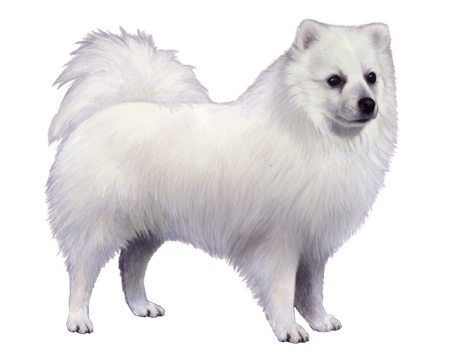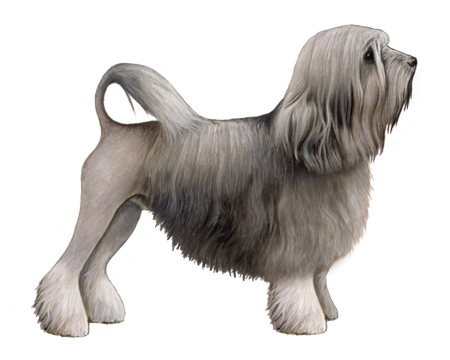
Volpino Italiano
The Volpino Italiano is a sweet, lively, and happy breed. These pups make vigilant watchdogs and playful family pets. If you're looking for a lot of personality in a small, fluffy package, the Volpino may be the pup for you.
Interested in discovering if your dog is a Volpino Italiano?
Check out Wisdom Panel's DNA tests.

Volpino Italiano Traits
General Appearance
Volpino Italianos are small, squarely built dogs with soft, long coats and a smooth, long stride.
Coat and Coloring
The Volpino's coat is long and straight, and it stands off the body. The breed's hair gives it the appearance of being wrapped in a muff—particularly around the neck, where the fur forms a fluffy collar.
The coat color can be solid white or deep, solid red (though white is generally more popular). There may be some pale orange shading on the ears.
Distinctive Physical Traits
Volpinos have pyramid-shaped heads, prick, upright ears, and round, dark brown eyes that give a vigilant expression. The fur on their hind legs forms trousers, and their long-haired tails curl over their backs.
Volpino Italiano Temperament
Volpino Italianos are playful, lively, and affectionate dogs. They grow very attached to their people and homes and make excellent family dogs.
Usually friendly around children, these energetic dogs are typically good playmates in homes with kids (as long as there is appropriate adult supervision). They are, however, often wary of strangers.
In fact, Volpinos tend to bark when someone approaches their territory. This trait makes them excellent watchdogs. But their noisy nature can be a poor fit for apartment living.


Volpino Italiano History
The Volpino Italiano descended from the ancient European Spitz. Italy's contribution to the Spitz family of dogs, Volpinos go back as far as the 15th century.
This spritely toy breed was a favorite in both the palaces of Italian noblemen and the homes of common folk. Volpinos served as loveable lap dogs and excellent watchdogs—thanks to their strong guarding instinct.
Michelangelo reportedly owned a Volpino. And he was just one of many artists to take an interest in the cheerful breed. Dogs resembling modern Volpinos appear in paintings dating back to 1502.
The United Kennel Club recognized the Italian Volpino in 2006. Today, they are an extremely rare breed—only a few thousand dogs are registered worldwide.
Volpino Italiano Care
Nutrition
Volpino Italianos require a diet formulated for their specific life stage (e.g., puppy, adult, senior). Little dogs like Volpino Italianos need more calories per pound of body weight than larger dogs. As such, experts recommend a dog food designed for small-breed dogs. These diets have the appropriate blend of nutrients and a smaller kibble size that is easier for small-breed dogs to chew and digest.
All dogs can become overweight if they eat too many calories. To avoid accidental overfeeding, portion out their food using a measuring cup. And don't forget to account for treats when considering their daily calories. Even a couple of extra treats can cause a petite dog like the Volpino to pack on the pounds.
Grooming
The Volpino's long double coat requires brushing a couple of times a week to remove loose hair. Bathing frequency depends on your personal preference (unless, of course, your pup gets into something messy). But before you bathe your Volpino, be sure to comb out any tangles or mats.
Nail trims, ear cleanings, and at-home dental care should also be part of their grooming routines. Small dogs are particularly prone to dental disease. So, talk with your veterinarian about starting professional teeth cleanings for your Volpino at a young age.
Exercise
Volpino Italianos are active, playful dogs that need plenty of daily exercise. Brisk walks and backyard play sessions are great ways for them to burn energy. This breed also enjoys agility, tracking, rally, competitive obedience, and musical canine freestyle—a mix of obedience training, dance, and tricks.
Training
Volpinos respond well to reward-based training using treats or their favorite toys. To overcome the headstrong tendencies of this breed, start a consistent training program in puppyhood.
Like all dogs, Volpinos benefit from early socialization. Introducing them to a variety of people, places, and animals at a young age will help them develop into well-mannered adult dogs.
Volpino Italiano Genetic Health Conditions
-
Primary Lens Luxation
Primary Lens Luxation (PLL) is a condition that can cause the lens of the eye to become loose and eventually displace. The disorder is caused by degeneration of the fibers that hold the lens in place.
Knowing if your Volpino Italiano is a carrier or at-risk for these conditions can help you and your veterinarian plan for your pup’s lifelong care. With Wisdom Panel™ Premium, you can get results for over 200 genetic health tests.
Breed Group
Companion
This group consists of dogs typically bred for the specific purpose of human companionship, and many are popular pets because of their gentle nature. They became more common as the concept and luxury of dogs as pets prevailed.



























_Color.png)










